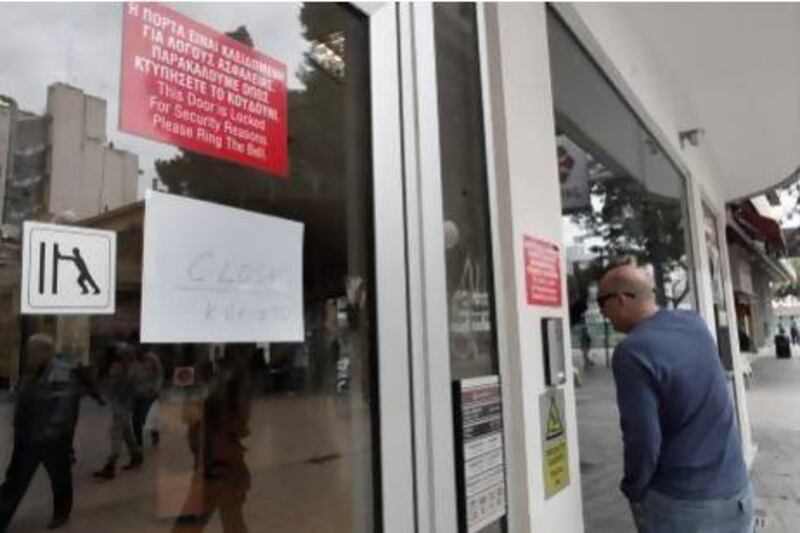NICOSIA // Cyprus's politicians last night threw out plans for a levy on bank savings crucial to an international bailout.
They rejected even a watered-down version of the plan that would have shielded small savers from the tax.
Hundreds of protesters outside parliament cheered in jubilation and sang the national anthem when they heard the plan had been rejected.
Cyprus will now have to come up with an alternative plan to raise the money. If it does not, it will not qualify for external rescue loans, its banks face collapse and the country could go bankrupt.
The president, Nicos Anastasiades, has called an emergency meeting of political leaders for this morning to discuss what to do next.
There was outrage on the island - home to about a million people - when the plan was revealed at the weekend to seize up to 10 per cent of savings in bank accounts as a condition of a €15.8 billion (Dh75bn) EU and IMF bailout.
To ease the burden on small savers, the government scrambled to tilt the tax towards those with deposits of more than €100,000. Savers with less than €20,000 would have been exempt from the levy.
Mr Anastasiades feared a higher levy on big deposits could drive away cherished Russian investors. About a third of the nearly €70bn deposits in Cyprus's outsized banking sector are believed to be held by Russians, who value the island as a friendly, low-tax place to do business.
Jittery Russian millionaires have flown to Cyprus in private jets in recent days for emergency consultations with their accountants.
Banks in Cyprus have been closed until Thursday to prevent a run on deposits and security staff will patrol branches when they reopen to control possible crowds of angry customers.
British officials said yesterday a Royal Air Force plane carrying €1 million in cash was sent to Cyprus to provide contingency funds for possible use by British military personnel and their families, in case ATMs and debit cards stop working. Cyprus's economy has been in turmoil since the harsh terms of the bank bailout were announced several days ago.
Elias Chiotellis, 38, a Cypriot engineer who has worked in Qatar for the past two years, planned to save enough money to buy a flat in Nicosia and return home to his family and girlfriend.
On Saturday, while in Cyprus for a holiday, he woke up to discover he could be losing €10,000 overnight.
"I'll have to cut down on expenses and put off the time when I can come home to Cyprus," he said dejectedly. "But I consider myself lucky at least to have a job in Qatar."
Many other Cypriots, who have a strong education ethic, feel bitter that savings they had put aside for their children's and grandchildren's futures could be raided.
"I'd scrimped and saved every penny for my son's education," said Argyro Toumazou, an unemployed cultural affairs consultant. "My husband is an actor who recently had a 10 per cent salary cut and was already on a low wage.
"It's been a very difficult winter - we couldn't even afford to put on the central heating."
Before last night's vote about 300 Cypriots protested outside parliament, which was cordoned off by police.
"If they vote for this tax they will face the fury of the people," said Markos Economou, a 47-year-old physics teacher and father of two at a similar protest on Monday. "The banks and the politicians should pay for this mess, not the people".
Many ordinary Cypriots blamed European leaders, especially the German chancellor, Angela Merkel, for the debacle. A hapless German television crew trying to interview Cypriots queuing up at a bank machine in central Nicosia was given short shrift.
"We are hugely disappointed by our so-called European partners," said one protester, Andreas Evangelou, 52, adding that savings he made to put his son through university would be taken.
Many of the 60,000 Britons who have made their home in Cyprus - 18,000 of them pensioners - were also in shock when they first heard the news about the bailout plan.
Clive Turner, 81, a retired businessman in Paphos, said: "Everyone's stunned. It's so indiscriminate. Most sensible Britons had their money in other jurisdictions, like the Channel Islands, and just brought into Cyprus what they needed to live on. But I know many people who've been caught out, like one friend who brought in a lot of money only last week to renovate his house and has now been badly hit."
Chris Drake, a former BBC correspondent retired in Limassol, said: "I'm furious with myself. I had so many opportunities to move my money abroad but was taken in by all the promises that any attempt to raid my savings was a red line not to be crossed. Experts said it was against the law. Now I've lost several thousand euros.
Even so, Mr Drake said, "I don't mind paying towards the bailout. After all it's my choice to live in Cyprus and the situation could be a lot worse if parliament rejects the deal, which would leave the country facing bankruptcy."
Sandro Dikaios, a Cypriot accountant with many foreign clients, agreed. The current bailout plan was a "disaster" that could undermine Cyprus as a financial centre, he said. "Yet we have to accept it and put our house in order to save our country."
[ mtheodoulou@thenational.ae ]
* Additional reporting by Reuters, the Associated Press and Bloomberg News






